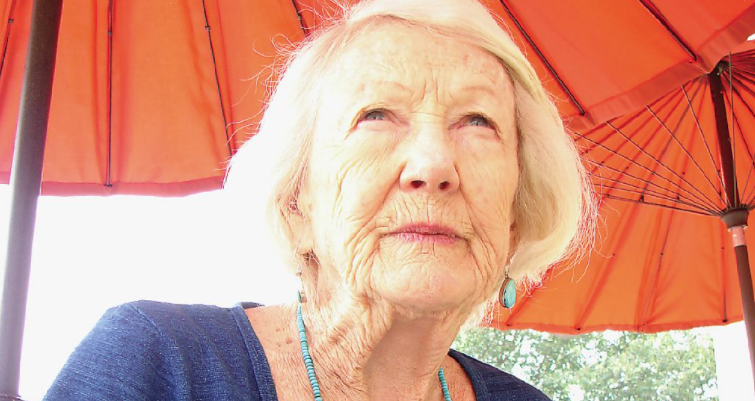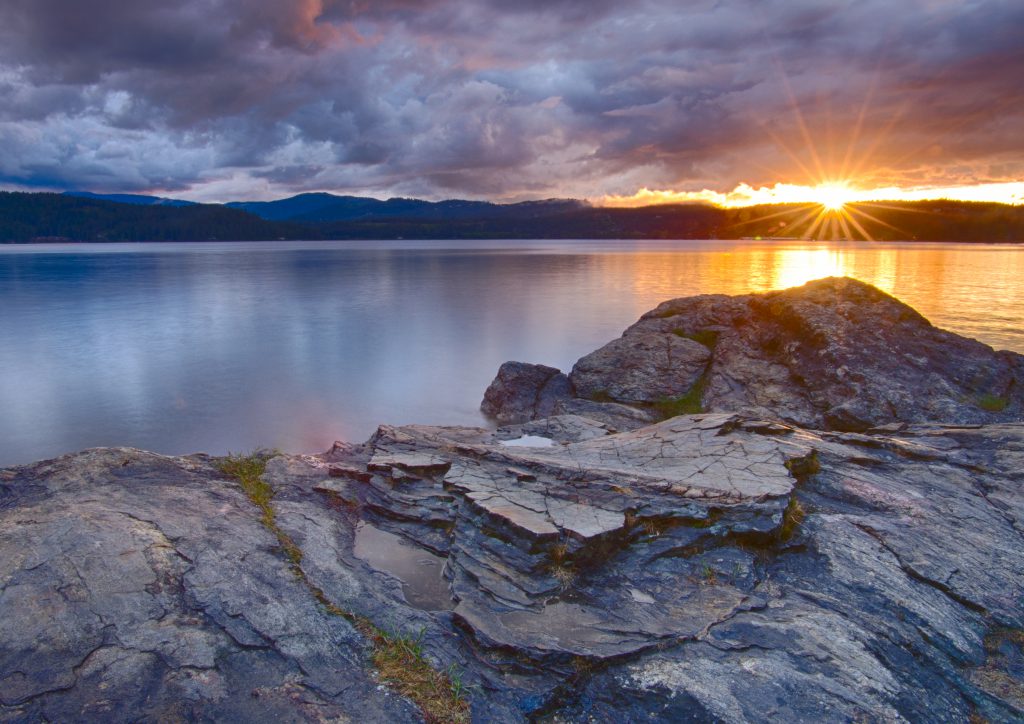Mary Lou Reed orders a small hot chocolate from a bakery in Coeur d’Alene. “I always say I’m not going to get whipped cream, but then they ask me – and what can you do?”
We sit with our drinks near a wide window that frames the ponderosa pine-covered side of Tubbs Hill, one of Mary Lou and her late husband Scott Reed’s success stories. In the ‘70s, the Reeds worked with other conservationists to preserve Tubbs Hill for public use, and it’s now one of the most well-known, accessible trail areas on Lake Coeur d’Alene.

Mary Lou Reed is a fixture in North Idaho activism and advocacy. She says she’s been retired for decades, but folks in the area beg to differ. To them, Mary Lou remains an integral part of North Idaho’s progressive movement.
“She’s very visible and active in the community still,” says Rich Gaertner, who’s lived in Coeur d’Alene for 48 years. He’s sitting at the table next to us, and chimes in to talk about Mary Lou’s impact when she steps away for a moment. Gaertner worked at North Idaho College in Coeur d’Alene and remembers Reed going above and beyond for the college during her time as a legislator. “She would come to the college and ask us what we needed and how she could support us. Most legislators don’t do that – they say they don’t have the time. But Mary Lou always made time.”
Reed continues to be a trusted leader in the Coeur d’Alene community and beyond. The afternoon we meet, she’s already had two phone calls that morning from people seeking her input on decisions, asking for a bit of advice.
Mary Lou came to North Idaho after traveling in Montana and Oregon. She says the opportunities for outdoor recreation and the community led her and Scott Reed to settle in the area. She puts it more simply, “We came here because of the mountains and the water.” Reed is a swimmer, and her love of Lake Coeur d’Alene is evident both in her conservation work and in the way she talks about it still today. “If you can swim in it in the summer, and skate on it in the winter – you can’t beat that.”
To Reed, the benefits of conservation and protecting water quality are obvious. When I ask her why people should care about the water in the panhandle, she gets more animated. “Because it’s precious! Clean, beautiful water comes from our snow – from our mountains. Here in North Idaho, we’re fortunate to have these public lands and lakes. It’s still a natural setting. This is what we have to preserve all over Idaho – this natural landscape that we’re fortunate to enjoy.”

It was this recognition of the uniqueness of Idaho’s wild places that led the Reeds to help found the Kootenai Environmental Alliance in 1972 and the Idaho Conservation League in 1973. ICL will be celebrating 50 years of statewide conservation work in 2023. “I’m proud of ICL because it has the capacity to make a difference in protecting Idaho,” Mary Lou says. “Supporting ICL is a good investment for me, because you see results from that investment.”
Reed approaches all of her work, including conservation, through the lens of fairness and equality. “It is this issue of opportunity,” she says, stirring melting whipped cream into her hot chocolate. “I feel strongly about everyone having as many opportunities as possible to be successful.” During her time as an Idaho state senator from 1984 to 1996, Reed was a strong advocate for early childhood education. She credits these career successes to her mother – a passionate kindergarten teacher who kickstarted Mary Lou’s educational career at three years old.
For Reed, progress in conservation and access to quality education are inseparable. She talks about the current debate on science standards in Idaho and what it means for climate change education. “Unless you have educated people, you’re not going to save the planet,” Reed explains. She believes that informed people are more likely to care about the environment and take action to protect it. “We need to foster respect and affection for the land – for our resources and beauty.”

Although Reed hasn’t skated on Lake Coeur d’Alene in 20 years, she continues to fight for its future – to ensure future generations can enjoy the lake and other places like it. However, she acknowledges that if conservation efforts are going to be successful, Idaho’s youth need to be empowered to take on this work. “It’s very important to recognize that there’s a younger generation picking up the future,” she says. This younger generation is able to lead the way because of the work of people like Mary Lou Reed – an icon in Idaho’s conservation history and advocate for protecting the best of Idaho.
While Mary Lou has made major strides for conservation in Idaho, she isn’t done yet. As we get up to leave the bakery, Rich Gaertner asks Mary Lou about one of her more recent conservation efforts. He had seen her in a meeting with other stakeholders the week prior. After she gives him an update, he says, “See, this just shows you – this is an effort that might not come to fruition for another 75 years, and she’s still working to protect these places. It’s not for her, it’s for everyone else to enjoy.”
But Mary Lou knows that conservation can be a long game. “It takes patience,” she says, “and you can’t take anything for granted. I have been fortunate to play a part in keeping Idaho, Idaho. Conservation is smart. It’s as simple as that. For the future.”
You can also be a part of protecting Idaho’s extraordinary places.
Sign up to get campaign updates from ICL, and be the first to take action when wild Idaho needs your voice.
